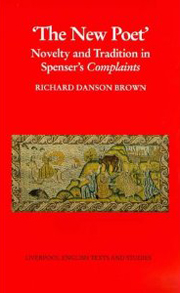Book contents
Introduction: ‘Subject unto chaunge’: Spenser's Complaints and the New Poetry
Summary
Poetic texts, like the human beings that make them, are themselves ‘Subject unto chaunge’. Textual change can take many forms: from the rediscovery and re-evaluation of previously marginalized texts (and conversely the displacement and marginalization of previously classic texts), to the loss of distant classics or unpublished manuscripts. A static text – secure either in unexamined prestige or oblivion – is necessarily a dead one. Spenser's Complaints, though not as widely read as they deserve, have been generally overlooked since their first appearance in 1591 to the detriment of the understanding of Spenser's achievement. In recent years critical re-evaluation of Complaints has been evident both in numerous articles and books and in at least one new edition. This edition signals one kind of change in the scholarly appreciation of the Spenser canon: where the Variorum edition (1947) calls the non-epic poetry The Minor Poems, the Yale edition (1989) uses the title The Shorter Poems of Edmund Spenser. Such editorial change aptly registers the more general change in the critical perception of the Complaints volume. In characterizing texts like Complaints and Daphnaïda as ‘minor poems’, earlier editors imply that they are a side show to the main attraction of The Faerie Queene. Modern scholars no longer feel that a hierarchical categorization is appropriate: the Complaints are shorter than, not inferior to, Spenser's epic. This is not to dispute the primacy of The Faerie Queene for the understanding of Spenser; but it does allow texts like Complaints to be read as serious (rather than ‘minor’) embodiments of his thinking.
- Type
- Chapter
- Information
- The New PoetNovelty and Tradition in Spenser's Complaints, pp. 1 - 36Publisher: Liverpool University PressPrint publication year: 1999

